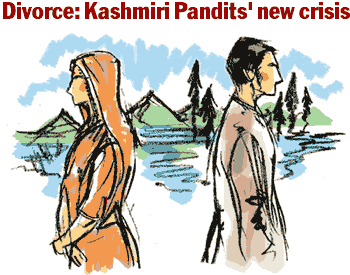
The Pandits of Kashmir valley, who have been displaced from their homes during the long years of conflict in Jammu and Kashmir, face a new crisis: discordant marriages that are ending in divorce. In recent years, divorce petitions filed by Kashmiri Pandits who have been forced to migrate to other towns in India have increased by 35-40 per cent, according to officials of the matrimonial court of Jammu and Kashmir.
In 1995, 250 divorce petitions were filed in the state, of which 30 applications came from Kashmiri Pandits. In 2001, the number had increased to 976 divorce petitions of which Pandits accounted for 300. In 2002, out of the 600 divorce petitions filed, 200 were from Pandits in the age group 25 to 40 years. The remaining applications for divorce came from the Dogra, Punjabi and Sikh communities. The last few years have also seen an "unprecedented increase" in the number of petitions filed by Pandit women, say court officials.
According to Justice S K Jamwal, who heads the Matrimonial Court, the Pandit community accounted for few cases of divorce prior to their exodus from the Valley more than a decade ago in the face of the separatist violence there. Since then, thousands of Kashmiri Hindus have left their homes to find shelter in camps in Jammu, New Delhi and other cities.
Professor Rekha Choudhary of the political science department, Jammu University, has initiated a research into the impact of migration on Kashmiri Pandits. She says the migration has led to extreme stress and sudden changes in living conditions. This, in turn, has resulted in the breakdown of the community's otherwise close-knit social fabric. The younger generation has largely failed to adjust to the difficult living conditions of migrants, and has become intolerant towards each other, she says.
| |||||||||||
Choudhary's study focuses on Pandits living in refugee camps. In some camps in Delhi, a family only had a thin curtain to separate it from the neighbour. Many of these families were used to living in big houses near freshwater streams. Due to overcrowding, several couples rarely shared private moments and often did not develop physical or emotional bonds. Interference by their in-laws served to further alienate them from each other.
Meena Koul, of the Purkhoo camp in Jammu, sought separation on grounds that her
marriage did not consummate. "Due to lack of privacy, I could not develop a bond with my husband. Moreover, he became impotent because of financial pressures and family responsibilities," she says.
"The dominant factors of contention among Pandit couples are economic insecurity and incompatibility. Since the education graph in the community is very high, they are more aware of their legal and social rights and thus approach the court. Besides, couples are unwilling to make minor adjustments, which is the major cause of disputes between them," says Justice Jamwal.
Psychiatrist Vinod Dhar, who counsels several Pandit couples on marital disputes, says after being forced to migrate, the community had to forgo many things in order to survive. He adds that the breakdown of the traditional family structure and the influence of other cultures have also led to the increase in marital discord. "A majority of the community has had very little exposure to urban lifestyle. Migration exposed them to different cultures, and to materialism," he says.
The increase in the number of women seeking divorce is attributed to their economic independence, an awareness of their rights and the psychological stress related to migration. Some lawyers say that, about a decade ago, divorce petitions filed by Pandit women were rare. But now, many come to the J and K court and file for divorce even if they have migrated to other states.
The main reason for separation is incompatibility. Pandit women are, however, also seeking divorce from husbands who are unemployed or addicted to drugs or alcohol. Princy Bharti approached the court for divorce after three years of marriage. Her husband was unemployed and a drug addict.
Shivani Dhar initiated legal proceedings against her husband last year. "I tolerated him for over three years but he did not stop drinking. Ultimately, I approached the court. I have a government job and can take care of my three-year-old daughter."
The elders in the community are disturbed by this trend. M L Koul, the All India Kashmiri Pandit Sabha general secretary, agrees that the uprooting of the community from Kashmir is largely responsible for the current crisis. In the absence (or destruction) of the joint family system, through which elders intervened constructively to sort out problems, the couples find they are unable to settle their differences.
Click here for more specials





